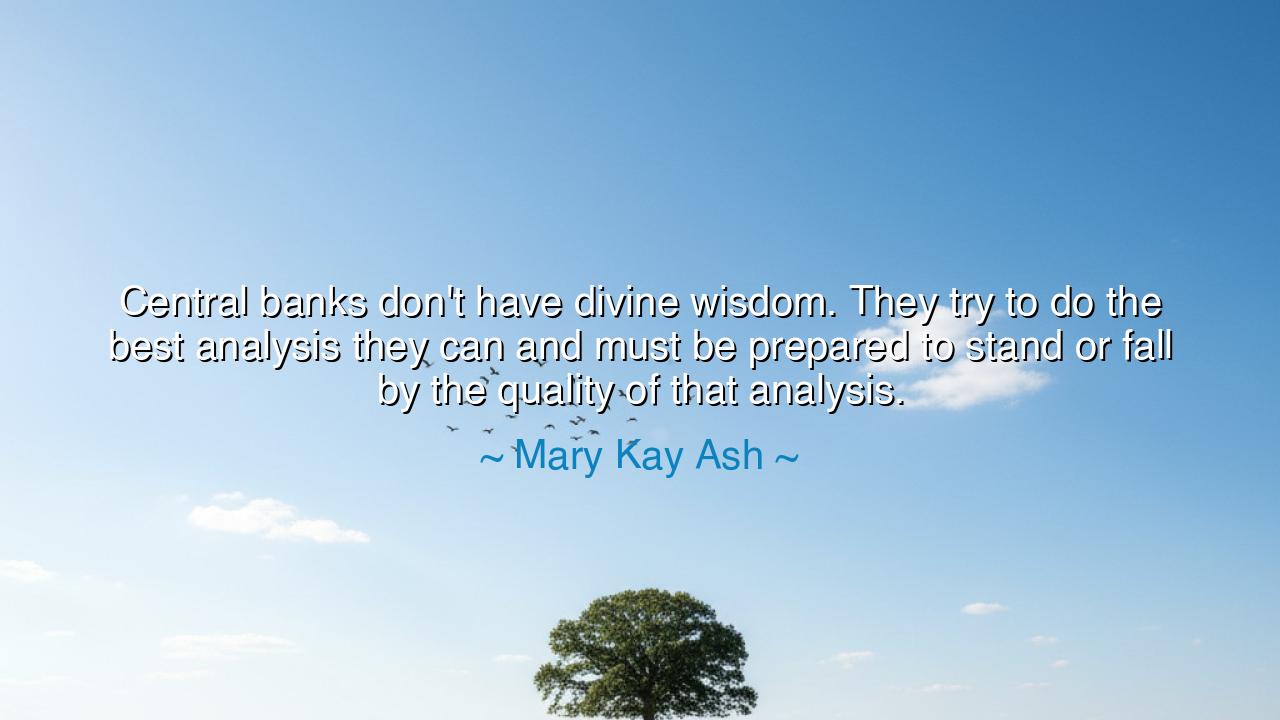
Central banks don't have divine wisdom. They try to do the best
Central banks don't have divine wisdom. They try to do the best analysis they can and must be prepared to stand or fall by the quality of that analysis.






Hearken, O seeker of knowledge, to the words of Mary Kay Ash, who spoke with the candor of one who has seen both the triumphs and trials of mortal endeavor. She tells us that central banks, those mighty stewards of a realm unseen yet profoundly felt, possess not divine wisdom, nor the certainty of the heavens. Their power is not absolute, for they walk the narrow path of analysis, guided by data, insight, and the collective experience of scholars and practitioners. The lesson whispers to us across time: even the most exalted institutions are bound by human judgment, and must tread carefully upon the ever-shifting currents of the world.
Know this, that the quality of their analysis is the measure by which they rise or fall. Like the mariners of old navigating treacherous seas, the leaders of these banks chart courses through storms of inflation, recession, and the shifting tides of commerce. Their wisdom is tested, not by celestial decree, but by the outcomes of mortal affairs. In this, we find a reflection of our own lives: the value of thoughtful deliberation, the courage to act with integrity, and the acceptance of the consequences borne by our decisions.
History provides the parable of Alan Greenspan, the former chair of the U.S. Federal Reserve, whose tenure witnessed both the prosperity of the 1990s and the peril of the 2008 financial crisis. In his hands, monetary policy was a delicate instrument, wielded with analysis rather than omniscience. When the housing bubble swelled, and the foundations of finance trembled, it became evident that even the most learned minds could err, and that no institution, however venerable, is immune from the weight of reality.
Yet in this human limitation lies profound wisdom: to embrace humility, to recognize that foresight is partial and that courage must accompany judgment. The central bank, in striving to act for the common good, mirrors the virtues of a just ruler or a sage: careful, conscientious, yet aware that error is possible. In this awareness, there is nobility, for to act with reason despite uncertainty is a mark of greatness, and a beacon for those who would follow.
Let this teaching be carried forward: in all endeavors where knowledge and analysis are your guides, know that perfection is not promised. Stand firm upon your work, let your reasoning be rigorous, and accept the outcome with grace, for wisdom is not the avoidance of error, but the courage to navigate through it. Thus, the mortal hand, though fallible, may shape destinies with care and honor.






HNNguyen Hoai Nam
I appreciate the honesty in this statement—it strips away the illusion that central banks operate with flawless wisdom. They’re made up of people doing their best with the information they have. Still, it raises an interesting question: should the public expect them to always get it right? Or is the real measure of success how they respond when their analysis falls short? Maybe true credibility lies in adaptability, not perfection.
VDDo Viet Dung
This quote strikes me as both realistic and slightly unsettling. It’s comforting to know that central banks strive for sound analysis, but it also reminds us that even their best efforts can fail. Given the global impact of their policies, I wonder if the system relies too heavily on human expertise instead of integrating more diverse perspectives or data-driven checks. Shouldn’t there be mechanisms to prevent overconfidence in a few economists’ judgments?
DCDuong chuc
I find this quote fascinating because it humbles the perception of authority that surrounds central banks. It acknowledges that economic decision-making is not an exact science but a series of informed guesses. However, doesn’t this level of uncertainty make the financial system more vulnerable? How do policymakers balance the need for confidence with the reality of human error and limited foresight in such critical institutions?
VSBui Van Sang
This quote highlights the human element behind institutions that often seem all-powerful or infallible. It’s refreshing to be reminded that central banks rely on analysis—not divine insight—to make decisions that impact millions. But it also raises concerns: if their actions are based on imperfect human judgment, how much trust should the public place in them? Should there be greater transparency or accountability when those analyses turn out to be flawed?